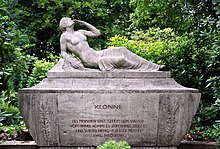August Klönne
August Klönne (born August 21, 1849 in Mülsborn ; † December 30, 1908 in Königsborn ; full name: August Albert Alexander Klönne ) was a German engineer and steel and bridge construction company in Dortmund . He founded the company Aug. Klönne .
Live and act
August Klönne was born on August 21, 1849 in Mülsborn (now Meschede) as the son of the married couple Johann Nathanael Ludwig Friedrich Klönne (1811–1867) and Auguste Albertine Klönne, nee Greve (1820–1869). His siblings included the mine director Friedrich Wilhelm Klönne (1834–1904) and the merchant Karl Engelbert Julius Klönne (1851–1882). The father Friedrich Klönne came from a farming family in the Münsterland that had lived in Hamm since the 17th century, while the grandfather Johann Friedrich Nathanael Klönne (* 1775) was already a merchant there. Friedrich Klönne was initially the owner of the Goldschmieding manor near Castrop, then tenant in Mülsborn near Meschede and a merchant in Oberhausen. All of these activities were unsuccessful, so that he died without wealth. The mother Auguste Klönne was the daughter of Franz Carl Greve and Maria Antoinetta Roling and sister of the Bochum mayor Max Greve .
August Klönne left school with primary school . Since his father was unable to provide him with an academic training for economic reasons, he began an apprenticeship as a mechanical engineer at Baroper Maschinenbau AG . He showed his technical talent for the first time when building a new petroleum gas plant for them. Later he was employed by the Bochum gas works , where he got to know the production and use of hard coal gas . Due to his good performance, he was entrusted with the planning of the new gas plant to be built in Bochum. In order to acquire further practical and theoretical knowledge, he attended the Bergschule Bochum , took private lessons with a civil engineer and moved to the Kölnische Maschinenbau AG in Bayenthal .
In 1873, at the age of 24, he was appointed to the management board of the Dortmund Union's gas and waterworks . In the following year he invented improvements for the firing of gas-generating furnaces, which were built shortly afterwards according to his system in Dortmund, Wesel, Barmen, Elberfeld, Hanover, Eisenach and Turin. As a result, his fame rose among experts, and several cities tried to win him over as head of their gas works. During this time he also continued his private education.
Her marriage to Gertrud Haverkamp (1846–1922), daughter of Bernhard Haverkamp (1810–1847) in 1874 resulted in nine children, including the twins Max (* December 17, 1878, † April 14, 1945) and Moritz Klönne ( * December 17, 1878; † January 13, 1962). Four of the children they shared died early.
However, on 1 July 1879 Klönne made with an engineering company and issued patents under his name independently . He made numerous improvements that were useful in the production of coke oven gas. As a non-academic and at the age of 30, RWTH Aachen offered him a chair for mechanical engineering and metallurgy, which he refused. He initially leased workshops to manufacture the iron structures required to build the gas works. In 1886 he bought the workshops of the Dortmunder Brückenbau-Aktien-Gesellschaft . August Klönne expanded the range of products to include bridge and iron construction: he built gas tanks, water tanks , railway bridges, station halls, locks, weirs and ship lifts. In cooperation with the TH Hanover and TH Berlin , he designed the first above-ground gas ring container . The first horizontal and vertical chamber furnaces were also Klönne's designs. In addition, he remained true to his original business area and developed numerous devices for the treatment of coke by-products.
1892 bought Klönne the Eagle Brewery, founded in 1867 in Unna, 1922 with the Linden brewery was incorporated. As a brewery owner, a beer brand was named after him. After he bought an inn in the Iserlohn district of Hennen in 1902, the house beer there was called Klönne's Hennener .
Aside from his commitment to his companies, he was on the supervisory board of the National Bank and on the membership representation of Gothaer Lebensversicherungsbank . In his hometown of Dortmund he did not take any public office, but acted quietly as a benefactor for churches, hospitals and orphanages. His passion was horse breeding, he had his own racing stable at the Hoppegarten horse racing track and was a sponsor of the first Dortmund horse racing track.
August Klönne died on December 30, 1908 at the age of 59 in his villa in Königsborn (now Unna, Friedrich-Ebert-Str. 60) and was buried in the family vault at the Ostenfriedhof Dortmund . His company was continued by his sons Max and Moritz and carried the name of the company's founder until it was taken over by Thyssen-Röhrenwerke AG .
literature
- Barbara Gerstein: Klönne, August Albert Alexander . In: Hans Bohrmann (Ed.): Biographies of important Dortmunders . People in, from and for Dortmund. tape 3 . Klartext, Essen 2001, ISBN 3-88474-954-4 , p. 109 ff .
- Barbara Gerstein: Klönne, August. In: New German Biography (NDB). Volume 12, Duncker & Humblot, Berlin 1980, ISBN 3-428-00193-1 , p. 108 f. ( Digitized version ).
Individual evidence
- ^ Barbara Gerstein: Klönne, August Albert Alexander . In: Hans Bohrmann (Ed.): Biographies of important Dortmunders . People in, from and for Dortmund. tape 3 . Klartext, Essen 2001, ISBN 3-88474-954-4 , p. 109 ff .
| personal data | |
|---|---|
| SURNAME | Klönne, August |
| ALTERNATIVE NAMES | Klönne, August Albert Alexander (full name) |
| BRIEF DESCRIPTION | German engineer and entrepreneur |
| DATE OF BIRTH | August 21, 1849 |
| PLACE OF BIRTH | Mülsborn |
| DATE OF DEATH | December 30, 1908 |
| Place of death | Königsborn |
